Welcome (back) to Powered…
Where we imagine AI in careers and lives.
IN TODAY’S ISSUE
Gemini's Invisible Commands Shape Online World
Anthropic's Claude 3: ChatGPT Challenger?
Must-See: OpenAI's Mind-Blowing Sora Videos
Saudi Arabia Unveils AI-Designed Qiddiya Circuit
China Supports AI Startups with 'Computing Vouchers
Gemini's Invisible Commands Shape Online World

Fox Business
Google Gemini's AI has an inherent bias, shaping online content based on predefined toxicity parameters.
Real Toxicity Prompts dataset, used in training, categorizes sites with biased labels like "bias=right" or "bias=left-center."
Concerns arise about how toxicity is defined, and controlled by a few corporate executives, impacting AI actions and influencing digital content.
The debate over Google Gemini highlights the importance of transparent AI training data and the potential consequences of biased toxicity definitions.
QUICK LINKS
225K ChatGPT Credentials for Sale on Dark Web
AI Company Trust Plummets to 35%
Generative AI Enhances Software Testing
Unlocking Generative AI: Hype vs. Results
Fast Food Drive-Thru: AI Doubts Arise
Anthropic's Claude 3: ChatGPT Challenger?

Daily Beast
Anthropic's Claude 3 models, Haiku, Sonnet, and Opus, claim to be powerful and responsive chatbots.
Opus, the most advanced, offers a 200,000-token context window, surpassing ChatGPT and Gemini.
Claude 3 aims to outperform competitors, providing level-headed responses to controversial questions, and challenging ChatGPT and Gemini's limitations.
Anthropic's Claude 3 emerges as a robust competitor in the chatbot space. Its performance and responsiveness could pose a significant challenge to established players.
Must-See: OpenAI's Mind-Blowing Sora Videos

Tom’s Guide
OpenAI's Sora generative video model showcases Hollywood-level production in recent clips.
Clips include scenes like a museum fly-through, alien encounters, and complex motion scenarios from a single prompt.
Sora combines transformer technology with image generation diffusion models, surpassing other AI video models in realism and capabilities.
OpenAI's Sora marks a significant leap in AI video capabilities. Its influence is evident as other AI companies take note, with plans to enhance their models to match Sora's advancements. This signals a transformative era in generative entertainment.
Saudi Arabia Unveils AI-Designed Qiddiya Circuit

ESPN
Saudi Arabia releases AI-generated images of the planned Qiddiya racing circuit, set to be completed by 2027.
The circuit, part of a larger project near Riyadh, features a 20-story elevated first corner, a glass-bottomed swimming pool, and a Six Flags theme park.
Designed by Alex Wurz and Herman Tilke, it aims to replace Jeddah on the F1 calendar, offering a unique race experience.
Saudi Arabia's Qiddiya reflects the country's commitment to motorsport and aims to become a prominent venue for global racing events.
China Supports AI Startups with 'Computing Vouchers

tom’s HARDWARE
China aids AI startups facing GPU shortages due to U.S. export restrictions with 'computing vouchers' ($140,000-$280,000).
Vouchers target LLM training costs amid rising data center expenses and scarce Nvidia processors.
Chinese internet giants restrict Nvidia GPU rental internally, responding to U.S. export rules, and contributing to resource scarcity.
Analysts note vouchers address cost barriers but not core resource scarcity issues.
China emphasizes self-reliance, subsidizing domestic chip use, developing state-run data centers, and creating data center clusters.
Government support includes reducing computing costs by 40-50% for AI companies using government-run data centers, as part of broader AI adoption efforts.
China's broader strategy emphasizes self-reliance, incorporating subsidies for domestic chip use and developing state-run data centers, aligning with efforts to accelerate AI adoption and maintain oversight in the AI sector.
That’s a wrap for today…
Thanks for reading!
If you want to subscribe to Powered Newsletter and receive future issues directly in your inbox, click here.
Want to share this newsletter with a friend or colleague via text, social media, or email? Just copy and paste this link: powered.beehiiv.com
Until next time,

